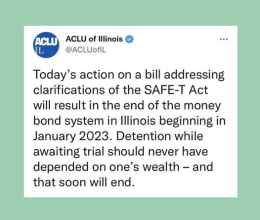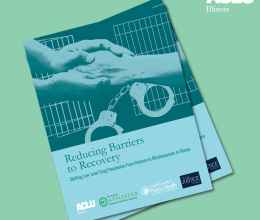
The Illinois legislature can join the growing list of states reforming, outdated, harmful laws regarding possession of marijuana in the next few weeks, according to a group of advocates committed to changing drug policy in Illinois and across the nation. The Community Renewal Society, the Marijuana Policy Project and the American Civil Liberties Union of Illinois are urging the legislature, particularly the House, to seize the opportunity to make real change in Illinois' marijuana laws in a way that doesn't carry collateral consequences. The groups noted that Illinois House may consider as many as three bills that would decriminalize the possession of small amounts of marijuana for personal use.
Recent public opinion polling demonstrates that a majority of Americans support a change in marijuana policy, with a solid majority supporting steps up to, and including, legalization of possession of small amounts of marijuana for personal use.
"The House has an historic opportunity to move the State of Illinois forward by decriminalizing the possession of small amounts of marijuana," said Mary Dixon, legislative director for the ACLU of Illinois. "We applaud the House for examining this issue and urge Representatives to take great care in examining the various proposals to insure that efforts to decriminalize marijuana and keep people out of the criminal justice system truly meets that goal -- and does not create a paper record that will follow an individual for the rest of their lives."
Currently there are three separate proposals that address decriminalizing marijuana under consideration this week. The deadline for passage of House bills from committees is this Friday, March 28th. House Bill 4299, sponsored by Representative Christian Mitchell and House Bill 5708, sponsored by Rep. Kelly Cassidy will be heard by the House Restorative Justice committee. House Bill 4091, sponsored by Rep. Michael Zalewski will be heard by the House Judiciary committee.
"It is critical that the Illinois House be part of the debate on changing antiquated marijuana laws," said State Representative Kelly Cassidy. "The public is demanding that we take up these reforms. But our first priority for any fix must be to end the long-term, negative consequences caused by arrests for the possession of small amounts of marijuana."
Specifically, the three organizations endorse the approach taken by Representative Cassidy in House Bill 5708. House Bill 5708 was approved by the House Restorative Justice Committee this morning on a vote of 5 to 2. The measure now moves the floor of the House.
This measure will be considered at a hearing of the House Restorative Justice Committee on Tuesday, March 25th at 9:30 a.m. House Bill 5708 creates a statewide, uniform "Cannibas Ticket" and the creation of a new regulatory, non-criminal penalty of a fine only whenever a person is found in possession of 30 grams or less of marijuana for personal use. Representative Cassidy proposes a process for assuring that once an individual pays the fine associated with the Cannibas Ticket, the record is sealed and is not considered a criminal record for purposes that may hinder future jobs, housing or educational opportunities.
"This is an important step in reducing the harms caused by marijuana prohibition," said Chris Lindsey, legislative analyst for the Marijuana Policy Project. "Illinois residents are fed up spending their tax dollars making criminals out of people for who choose to a substance that is safer than alcohol. The Senate and House should join the Restorative Justice Committee in supporting this sensible reform."
“Criminal arrests for low levels of marijuana possession waste tax payers’ dollars, fall disproportionately on minority communities, and impair the ability of individuals to become employed. Municipalities on their own across Illinois have already taken this obvious step. We should do so at the state level by passing HB 5708.” said Rev. Alexander E. Sharp, Acting Executive Director of the Community Renewal Society.
Last year, the ACLU produced a national report on marijuana arrests, using data reported each year to the FBI by state and local law enforcement agencies. That report revealed that since 1995, the number of marijuana arrests nationally had grown by more than half. In Illinois, according to the report, there were more than 50,000 marijuana arrests in 2010 alone, 98% of which were for possession of small amounts of marijuana without any intent to sell. The cost to taxpayers of enforcing these laws is enormous. The coalition of groups supporting House Bill 5708 note the substantial law enforcement time and resources diverted to book and prosecute thousands of individuals each year for simple possession. These resources, according to all three groups, could be better utilized for preventing and resolving serious crimes.






